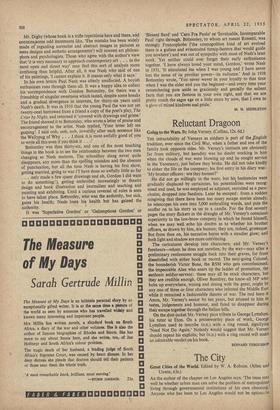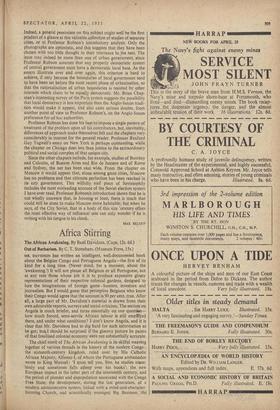The City
As the author of the chapter on Los Angeles says, 'The issue may well be whether urban man can solve the problem of metropolitan. living through governmental institutions of his own choosing. Anyone who has been to Los Angeles would not be optimis;ic. Indeed, a general pessimism on this subject might well be the first product of a glance at this valuable collection of studies of separate cities, or at Professor Robson's introductory analysis. Only the photographs are optimistic, and this suggests that they have been chosen with too little thought to their relevance to the .text. The issue may indeed be more than one of urban government, since Professor Robson assumes that any properly democratic system of central government must have a democratic local base. As the essays illustrate over and over again, this criterion is hard to achieve, if only because the boundaries of local government tend to have been set before the most recent phase of urbanisation, so that the rationalisation of. urban boundaries is resisted by other interests which claim to be equally democratic. Mr. Brian Chap- man's interesting survey of the Paris system suggests the possibility that local democracy is less important than the Anglo-Saxon tradi- tion would make it appear, and also casts serious doubts, from another point of view to Professor Robson's, on the Anglo-Saxon preference for ad hoc authorities.
Professor Robson has done his best' to impose a single pattern of treatment of the problem upon all his contributors, but, inevitably, differences of approach make themselves felt and the chapters vary considerably in interest for the general reader. Professor Rexford Guy Tugwell's essay on New York is perhaps outstanding, while the chapter on Chicago does less than justice to the extraordinary political and social complex of that unique city.
Since the other chapters include, for example, studies of Bombay and Calcutta, of Buenos Aires and Rio de Janiero and of Rome and Sydney, the net has been cast wide. From the chapter on Moscow it would appear that, alone among great cities, Moscow has no problems and that ultimate perfection has been reached in its city government. This wilfully naif piece of Sovietophily includes the most misleading account of the Soviet election system I have ever read. Professor Robson's introduction shows that he is not wholly unaware that, in housing at least, there is much that could still be done to make Moscow more habitable; but when he says, of the City Soviet, that in a body of this size 'oratory offers the most effective way of influence' one can only wonder if he is writing with his tongue in his cheek.
MAX BELOFF











































 Previous page
Previous page